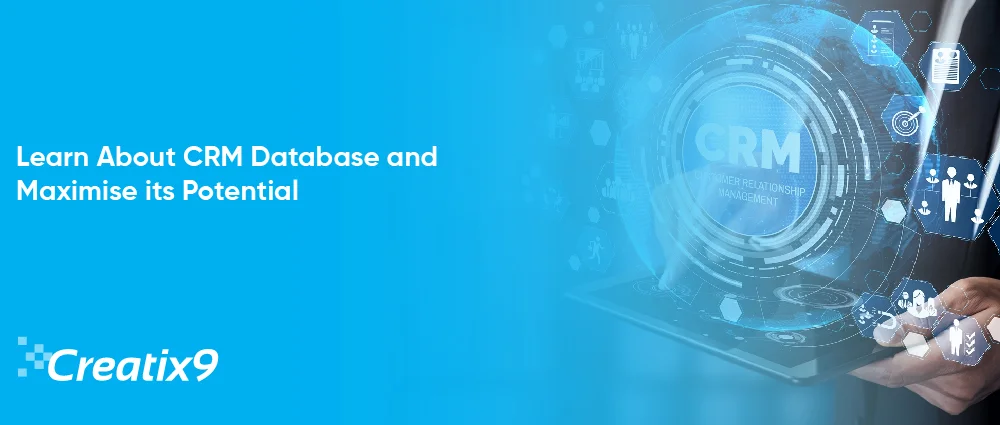
Modern customer data has become intricate. Customers interact through many communication channels and possess heightened expectations regarding speed and personalisation, like the tailored experience that Amazon is delivering to its clients.
Numerous current CRM platforms aim: To come up with the requisite solutions for businesses. Yet, the efficacy of these platforms hinges solely on the quality of their data. The CRM database constitutes the linchpin for an efficient CRM tool and optimising customer data to derive fresh business insights.
What is a CRM database?

A CRM database for customer relationship management (CRM) serves as a comprehensive repository for all client data collected, regulated, transformed, and shared throughout an organisation. Within this database, you’ll find marketing and sales reporting tools, which prove invaluable in spearheading sales and marketing initiatives and bolstering customer engagement. CRM systems’ capacity to seamlessly integrate data from other applications, their features, performance, and user-friendliness vary.
CRM databases categorise data into three distinct groups:
- Operational CRM: This category streamlines business tasks related to sales, marketing, and service.
- Analytical CRM: This type aids business leaders in strategising and making informed decisions to enhance customer service.
- Collaborative CRM, also known as Strategic CRM: This variant shares customer information across various business units with the information they want to do their tasks excellently.
For instance, Salesforce— a US cloud-based software firm create a tailor-made and scalable system. Clients uses it to address their specific business needs; ranging from operational, analytical or collaborative CRMs. It is liable on the selection of modules by many business clients. Salesforce hosts all clients’ data on the cloud, and they can right to use the products online. Hence, setting up Salesforce or any CRM database correctly is essential for effective use.
Contact Creatix9— the UK’s most reliable custom software development company for CRM updating or creation. Request a quote now.
Advantages of a worthy CRM database

The potency of a CRM lies in its capacity to access accurate information from a reliable source and deliver it to the right customer at the appropriate moment. Three advantages stemming from a robust CRM database are:
Tailored Customer Experience
Effective marketing hinges on identifying the ideal targets for upcoming campaigns, discounts, or incentives. These insights are derived from comprehensive, well-managed, and integrated CRM data. Marketing teams are given the ability to deliver the individualised experiences that customers expect thanks to a unified CRM database that acts as a single source of truth for every customer or lead.
Expedited Sales Procedures
Competent CRM systems consistently and efficiently organise contact details. Sales professionals and marketers on the go have instant access to client information all in one place. Sustaining real-time customer data updates demands a CRM database adept at handling multiple data streams and smooth data integration.
Regulatory Compliance and Data Privacy
Both customers and regulatory bodies demand meticulous data management to safeguard privacy and ensure data accessibility. In the event of a data breach, a company has to rectify the data leak and rebuild a positive customer relationship. A business must be aware of the client information it holds and how it complies with onerous laws like the General Data Protection Regulation (GDPR) and the California Consumer Privacy Act.
Non-compliance can result in substantial fines. A proficient CRM database allows comprehensive customer data tracking from inception to conclusion, ensuring requisite data access and safeguarding client information.
Data migration: 4 stages to begin with a CRM database

The distribution of customer data includes emails, spreadsheets, Post-It notes, Facebook, LinkedIn, and Twitter, among other physical and digital methods. A CRM system must centralise all this data in one location to engage in meaningful client interactions and analysis. Establishing and continuously updating this requires an efficient and secure data migration process.
Moving data into the CRM database may initially appear overwhelming. Still, it can be broken down into easily manageable steps:
Planning for Data Migration
To determine the volume of data to be transferred and how the new system will support business and data goals, stakeholders, managers, and technical staff get together. The data governance team oversees the data migration programme, assigning roles and responsibilities.
Analysis and Design of Data Migration:
Data migration analysis involves scrutinising the data migration plan to ensure its readiness or identify necessary adjustments. Members of the team evaluate data quality to fix corrupted or incorrectly formatted data and ensure data security in accordance with rules. Technical staff delve into data environments and migration particulars, encompassing staging, testing, and production.
Implementation of Data Migration
The process of migrating data begins methodically and establishes a staging place for the data. Before moving on to total data migration, it frequently starts with a small data subset. Operations go over to the new system following thorough testing.
Data Migration Conclusion
This phase outlines achievements and lessons learnt from the data migration initiative. The migration team documents knowledge essential for training and future project success.
Ongoing migration follows a similar path regardless of the multitude of potential data sources. While it may initially seem challenging, data migration tools simplify the process, making it readily manageable.
CRM database instance: Uploading 120 data feeds

Age UK, the biggest charity in the UK, uses Microsoft Dynamics CRM to better understand its customers and personalise their experiences.
Using a data quality tool, Age UK integrates and imports data from 120 sources. Consequently, Age UK enhances its understanding of clients, which is more accurate and timely. Moreover, it reduces the resources required for rapid data cleaning when handling individual data feeds. This approach enables Age UK to access precise information in almost real-time.
4 techniques to improve your CRM data
The value of a CRM system relies on having reliable, high-quality data. When more data flows into the CRM system at an accelerated pace, it becomes imperative to uphold its relevance to the business, ensure accessibility for those who need it, respect individual privacy, and keep it open for exploring new business opportunities.
Use these four techniques to improve your CRM data:
Invest in Data Governance
Data governance have formal practises and procedures for handling data assets, like CRM data. It establishes clear ownership of data, delineates data procedures, and facilitates communication to uphold data quality and security within the CRM database.
Invest in Data Automation Tools
Instead of manually rectifying records with identical values, explore automated options such as group edits. Many vendors offer tools within their suites that simplify data quality tasks, saving time and effort in maintaining the CRM database.
Generate Metrics Using CRM Data
Engage with business units, like sales and marketing, to create reports aligning with their success objectives. Utilise examples from sources like PAT RESEARCH to evaluate business efficiency and effectiveness, yielding insights into the CRM database’s performance.
Identify Quick Wins with CRM Data
Utilise Bernard Marr’s data use template to pinpoint business and data strategies, then refine them into specific goals. Find fast wins from these use cases and evaluate how they might improve the CRM system. As a component of your marketing strategy, promote these objectives.
CRM database instance: An entirely integrated CRM
By connecting its CRM database to its product lifecycle management (PLM) system using an integration tool, Lectra, a global leader in efficient manufacturing processes, maximises the potential of both databases. This results in various business units sharing consistent customer data, including supplier lists and nomenclature.
The cloud CRM and the future of customer data:
A cloud CRM denotes a CRM system that a third-party provider hosts and is accessible via the Internet. Cloud CRM falls under the software as a service (SaaS) category, simplifying the setup and maintenance of CRM technology while reducing costs and time investment.
Contemporary businesses should consider adopting a cloud CRM to meet evolving customer expectations. While many businesses, such as retailers, have yet to fully leverage their customer data, utilising cloud-based solutions will soon become necessary. Retail growth through cloud CRM is expected to surge over the next 18 months, with most of these enterprises either initiating a new cloud CRM system or incorporating one to enhance their product offerings.
Move forward Your or Create a Fresh CRM database with Creatix9 UK
Businesses need a CRM database that is both high quality and high performing in order to keep up with their consumers. An effective CRM database gathers, governs, transforms, and shares customer information. Its strength lies in the ability to source the correct information from a reliable origin and deliver it to the correct customer at the precise moment.
Vendors have made this objective within reach. Integration of multiple data feeds and systems into the CRM database let this happen. You can streamline sales and marketing operations, enhance analysis, and facilitate collaboration, as all data you can access easily in almost real-time can be relied upon.
Successful data migration, along with strong data governance and the highest data quality standards, form the basis of an optimised CRM database.
When your organisation is prepared to launch or upgrade your CRM database, utilise the Creatix9 UK CRM development service in the UK. With us, you can ensure data security as we have the tools for a smooth, quick and secure data migration in case of upgrading or coming up with an entirely new CRM database.
Give your quote at our digital creative agency UK site today.

